National Register of Historic Places listings in Winona County, Minnesota

Location of Winona County in Minnesota
This is a list of the National Register of Historic Places listings in Winona County, Minnesota. It is intended to be a complete list of the properties and districts on the National Register of Historic Places in Winona County, Minnesota, United States. The locations of National Register properties and districts for which the latitude and longitude coordinates are included below, may be seen in an online map.
There are 43 properties and districts listed on the National Register in the county. A supplementary list includes four additional sites that were formerly listed on the National Register.
- This National Park Service list is complete through NPS recent listings posted December 16, 2016.[1]
Current listings
| [2] | Name on the Register | Image | Date listed[3] | Location | City or town | Description |
|---|---|---|---|---|---|---|
| 1 | Anger's Block |  |
(#78001571) |
116-120 Walnut Street 44°03′07″N 91°38′01″W / 44.051935°N 91.633492°W |
Winona | 1872 commercial building, one of the oldest still standing in Winona's central business district.[4] Also a contributing property to the Winona Commercial Historic District.[5] |
| 2 | Willard Bunnell House | |
(#73000998) |
Homer and Matilde Streets 44°01′20″N 91°33′35″W / 44.022321°N 91.559628°W |
Homer | Minnesota's first permanent house south of Saint Paul, built in 1849. Also noted for its Gothic Revival architecture with regional river valley features and its association with pioneer brothers Willard (1814–1861) and Lafayette Bunnell (1824–1903).[6] Now a house museum.[7] |
| 3 | Central Grade School |  |
(#12000071) |
317 Market Street 44°02′53″N 91°38′05″W / 44.047951°N 91.634734°W |
Winona | 1930 elementary school, one of five new facilities built by Winona Public Schools to implement progressive educational reforms such as separated grades, kindergartens, gymnasiums, art and music classrooms, and improved hygiene and fire safety features.[8] |
| 4 | Chicago, Milwaukee & St. Paul Railway Station | 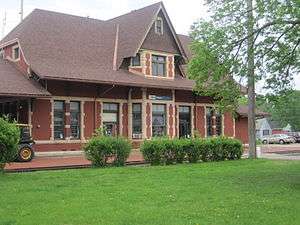 |
(#13000327) |
65 East Mark Street 44°02′39″N 91°38′24″W / 44.0443°N 91.6401°W |
Winona | Long-serving 1888 railway station representing the development of train transportation in Minnesota with Winona as a major rail hub. Now the Winona Amtrak station.[9] |
| 5 | Choate Department Store | |
(#76001079) |
51 East 3rd Street 44°03′07″N 91°38′11″W / 44.052034°N 91.636463°W |
Winona | 1881 commercial building of Hannibal Choate (1835–1923), prominent and influential early merchant of southeast Minnesota.[10] Also a contributing property to the Winona Commercial Historic District.[5] |
| 6 | Church of Saint Stanislaus-Catholic | |
(#84000251) |
624 East 4th Street 44°02′49″N 91°37′20″W / 44.046999°N 91.622271°W |
Winona | 1895 Romanesque Revival church built by Minnesota's largest Polish American community; one of Winona's most prominent architectural landmarks.[11] Now termed the Basilica of Saint Stanislaus Kostka. |
| 7 | Church of the Holy Trinity-Catholic | |
(#84001721) |
83 Main Street 44°05′52″N 91°49′08″W / 44.097841°N 91.818911°W |
Rollingstone | 1869 church expanded in 1893, noted for its Gothic Revival architecture and central role in the religious, social, and—through its associated parochial school—academic life in a Luxembourg American community.[12] |
| 8 | East Second Street Commercial Historic District |  |
(#90002198) |
66–78 Center, 54–78 East 2nd, and 67–71 Lafayette Streets 44°03′12″N 91°38′07″W / 44.053334°N 91.635206°W |
Winona | One of Minnesota's few surviving remnants of a river town's original business district—with 14 contributing properties on one block mostly built in the late 1860s—and a symbol of Winona's swift growth as a lumber and grain center.[13] |
| 9 | Benjamin Ellsworth House |  |
(#84001718) |
U.S. Highway 14 43°58′43″N 91°57′23″W / 43.97862°N 91.956358°W |
Utica | 1873 Italianate house of Utica's founder Benjamin Ellsworth (1826–1890).[14] |
| 10 | Dr. J. W. S. Gallagher House |  |
(#84000245) |
451 West Broadway 44°03′08″N 91°38′56″W / 44.052268°N 91.648998°W |
Winona | Well-preserved example of the modest residential commissions designed by the noted Prairie School architectural firm of Purcell & Elmslie.[15] |
| 11 | Grain and Lumber Exchange Building | |
(#77000774) |
51 East 4th Street 44°03′04″N 91°38′13″W / 44.051083°N 91.63696°W |
Winona | Exemplary Renaissance Revival office building constructed in 1900.[16] |
| 12 | William Hemmelberg House |  |
(#86002916) |
County Highways 26 and 37 44°05′20″N 91°59′30″W / 44.088802°N 91.991588°W |
Elba vicinity | Stone farmhouse built c. 1858 and expanded c. 1870, a rare surviving vestige of the Whitewater Valley's early pioneers.[17] |
| 13 | Abner F. Hodgins House | |
(#84000248) |
275 Harriet Street 44°03′08″N 91°38′46″W / 44.052084°N 91.646243°W |
Winona | Exemplary 1890 Queen Anne house of lumberman Abner F. Hodgins (1826–1896), a notable leader in the key industry behind Winona's early prominence.[18] |
| 14 | Huff-Lamberton House |  |
(#76001080) |
207 Huff Street 44°03′11″N 91°38′39″W / 44.053109°N 91.644292°W |
Winona | One of Minnesota's oldest and best preserved Italian Villa style houses, built in 1857 and given a Moorish Revival porch in 1873.[19] |
| 15 | Jefferson School |  |
(#12000072) |
1268 West 5th Street 44°03′16″N 91°40′16″W / 44.054471°N 91.671146°W |
Winona | 1938 elementary school, one of five new facilities built by Winona Public Schools to implement progressive educational reforms. Also noted for its Public Works Administration funding and Art Moderne architecture.[20] |
| 16 | Kirch/Latch Building | 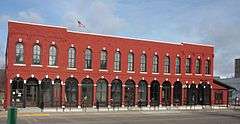 |
(#75001036) |
114-122 East 2nd Street 44°03′10″N 91°38′02″W / 44.052899°N 91.633814°W |
Winona | c. 1868 commercial building noted for its transitional Gothic Revival/Italianate architecture and occupation by the largest of several produce wholesalers based in Winona to take advantage of its river and rail connections.[21] |
| 17 | Laird, Norton Company Building | |
(#14000392) |
125 W. 5th St. 44°03′03″N 91°38′24″W / 44.05086°N 91.639909°W |
Winona | Headquarters 1918–1958 of a major lumber company established in the 1850s, which milled logs from northern pineries and distributed them via railside lumber yards in southern Minnesota and South Dakota.[22] |
| 18 | Madison School |  |
(#12000073) |
515 West Wabasha Street 44°03′06″N 91°39′05″W / 44.051687°N 91.651313°W |
Winona | 1932 elementary school, one of five new facilities built by Winona Public Schools to implement progressive educational reforms such as separated grades, kindergartens, gymnasiums, art and music classrooms, and improved hygiene and fire safety.[23] |
| 19 | Nicholas Marnach House | |
(#78003406) |
Off County Highway 26 in Whitewater Wildlife Management Area 44°07′11″N 92°01′57″W / 44.119824°N 92.032384°W |
Elba vicinity | c. 1857 stuccoed stone house, oldest surviving example of the traditional European construction occasionally produced by Germanic immigrants to Southeast Minnesota.[24] |
| 20 | Merchants National Bank | |
(#74001045) |
102 East 3rd Street 44°03′08″N 91°38′06″W / 44.05212°N 91.634907°W |
Winona | Leading example of the Prairie School banks designed by Purcell, Feick & Elmslie, constructed in 1912; a significant influence on early-20th-century American architecture.[25] Also a contributing property to the Winona Commercial Historic District.[5] |
| 21 | Model School Building and College Hall of the Winona Normal School |  |
(#13000884) |
416 Washington & 151 W. Sanborn Sts. 44°02′52″N 91°38′34″W / 44.047877°N 91.642875°W |
Winona | 1915 and 1924 laboratory school buildings of Minnesota's first normal school, active 1860–1971. Now Winona State University's Phelps Hall and Somsen Hall.[26] |
| 22 | Pickwick Mill | |
(#70000314) |
24813 County Road 7 43°58′49″N 91°29′48″W / 43.980382°N 91.496718°W |
Pickwick | One of southeast Minnesota's oldest surviving water-powered gristmills, built in 1854.[27] Now a non-profit historic attraction.[28] |
| 23 | Saint Charles City Bakery | 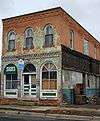 |
(#84001723) |
501 Whitewater Avenue 43°58′22″N 92°03′53″W / 43.972853°N 92.064681°W |
St. Charles | 1876 commercial building, last remnant of St. Charles' original business district, which was lost to an 1891 fire and relocation to a more central, trackside location.[29] |
| 24 | Schlitz Hotel | |
(#82003087) |
129 West 3rd Street 44°03′10″N 91°38′21″W / 44.052848°N 91.639225°W |
Winona | 1892 hotel and café established by the Joseph Schlitz Brewing Company, a well-preserved example of a once-common business venture by breweries.[30] Also a contributing property to the Winona Commercial Historic District.[5] |
| 25 | Sugar Loaf | 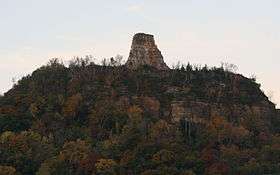 |
(#90001164) |
Southwest of U.S. Highway 61 and Minnesota State Highway 43 44°01′42″N 91°37′36″W / 44.028377°N 91.626585°W |
Winona | 500-foot-high (150 m) river bluff with a distinctive pinnacle created by 19th-century quarrying; one of Minnesota's most famous landmarks to travelers and tourists since the 1870s.[31] |
| 26 | Sugar Loaf Brewery | |
(#78001572) |
Lake Boulevard and Sugar Loaf Road 44°01′44″N 91°37′27″W / 44.028866°N 91.624213°W |
Winona | Brewery complex with storage caves dug into Sugar Loaf, associated with prominent local brewer Peter Bub and his successors, who produced beer on the site 1872–1969.[32] |
| 27 | Trinity Episcopal Church |  |
(#84001726) |
805 Saint Charles Avenue 43°58′11″N 92°03′58″W / 43.969787°N 92.0661°W |
St. Charles | 1874 Carpenter Gothic church significant for its well-preserved interior and exterior.[33] |
| 28 | Trinity Episcopal Church |  |
(#84001727) |
8110 West Main Street 44°01′39″N 91°45′56″W / 44.027578°N 91.765632°W |
Stockton | 1859 church noted for its well-preserved Carpenter Gothic architecture and shared importance to a community established by American-born settlers but later dominated by German immigrants.[34] |
| 29 | Washington-Kosciusko School |  |
(#12000074) |
365 Mankato Avenue 44°02′33″N 91°37′10″W / 44.042587°N 91.619499°W |
Winona | 1934 elementary school, one of five new facilities built by Winona Public Schools to implement progressive educational reforms. Also noted for its funding by the Public Works Administration, the New Deal's largest relief program.[35] |
| 30 | J.R. Watkins Medical Company Complex | |
(#84003940) |
150 Liberty Street 44°02′58″N 91°37′41″W / 44.049473°N 91.628176°W |
Winona | Longtime headquarters of the nation's largest direct sales company in the early 20th century, with seven contributing properties built 1900–1914, including a 1911 Prairie School building designed by George W. Maher.[36] |
| 31 | Paul Watkins House | |
(#84000255) |
175 East Wabasha Street 44°02′49″N 91°38′08″W / 44.047026°N 91.635449°W |
Winona | Jacobethan house built 1924–27, designed by architect Ralph Adams Cram for Paul Watkins (1865–1931), second-generation leader of the J.R. Watkins Company and progenitor of its famous door-to-door sales strategy.[37] |
| 32 | Whitewater Avenue Commercial Historic District | |
(#84001736) |
900–1012 Whitewater Avenue 43°58′08″N 92°03′54″W / 43.968826°N 92.065119°W |
St. Charles | Architecturally cohesive row of seven commercial buildings constructed 1890–1901.[38] |
| 33 | Whitewater State Park CCC/WPA/Rustic Style Historic Resources | |
(#89001661) |
Off Minnesota State Highway 74 south of Elba 44°03′15″N 92°02′45″W / 44.054061°N 92.045777°W |
Elba vicinity | Park facilities with 29 contributing properties built 1934–41, significant as examples of New Deal federal work relief, diverse National Park Service rustic design, and landscape architecture on a challenging site.[39] |
| 34 | Winona and St. Peter Engine House | |
(#84001730) |
75 Gould Street 44°03′26″N 91°40′07″W / 44.057263°N 91.668546°W |
Winona | c. 1890 engine house, sole surviving structure of a railroad shop complex that was a major local employer and a component of the rail network that fueled Winona's economy.[40] |
| 35 | Winona and St. Peter Railroad Freight House | |
(#84001733) |
Front and Center Streets 44°03′14″N 91°38′06″W / 44.05382°N 91.63504°W |
Winona | Winona's last surviving freight warehouse, built 1882–3; a symbol of the Winona and St. Peter Railroad, which helped develop Minnesota and Dakota Territory with Winona as a major manufacturing and shipping center.[41] |
| 36 | Winona City Hall |  |
(#99000806) |
207 Lafayette Street 44°03′03″N 91°38′10″W / 44.050848°N 91.636114°W |
Winona | Exceptional 1939 Classical Moderne city hall funded by the Public Works Administration, a local example of the massive federal relief efforts of the New Deal.[42] |
| 37 | Winona Commercial Historic District | |
(#98001220) |
3rd Street between Franklin and Johnson Streets 44°03′07″N 91°38′07″W / 44.051965°N 91.635173°W |
Winona | Six-block downtown reflecting the prosperity of a river and rail town that grew into southeast Minnesota's leading commercial center of the late 19th century, with 65 contributing properties built 1868–1920.[5] |
| 38 | Winona County Courthouse | 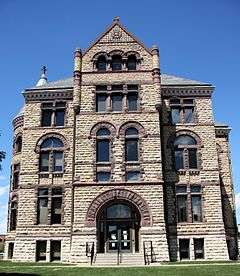 |
(#70000313) |
171 West 3rd Street 44°03′11″N 91°38′26″W / 44.052922°N 91.640439°W |
Winona | 1889 Romanesque Revival county courthouse, an artistic manifestation of Winona's prosperous riverboat and logging era.[43] |
| 39 | Winona Free Public Library | 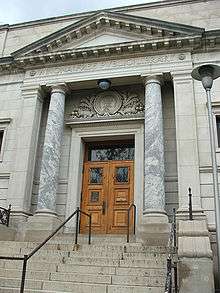 |
(#77000775) |
151 West 5th Street 44°03′04″N 91°38′26″W / 44.051088°N 91.640656°W |
Winona | 1899 Neoclassical public library noted for its architectural and cultural significance; specifically designed to house public art along with library services.[44] |
| 40 | Winona High School and Winona Junior High School | |
(#03001350) |
166 and 218 West Broadway 44°03′03″N 91°38′31″W / 44.050882°N 91.64192°W |
Winona | Adjacent schools completed in 1917 and 1926, representative of local efforts to implement progressive educational trends in updated facilities, while a 1928 auditorium hosted local and national touring performances.[45] |
| 41 | Winona Hotel | |
(#83000947) |
157 West 3rd Street 44°03′11″N 91°38′23″W / 44.05297°N 91.63972°W |
Winona | 1889 Romanesque Revival hotel built to accommodate visitors during Winona's heyday as a fine theatre destination.[46] Also a contributing property to the Winona Commercial Historic District.[5] |
| 42 | Winona Masonic Temple |  |
(#98000152) |
255 Main Street 44°03′03″N 91°38′22″W / 44.050697°N 91.639307°W |
Winona | Masonic Temple built 1908–9, the headquarters of a fraternal organization important to Winona's civic and social development. Also noted for its large, intact collection of theatrical backdrops and stage equipment.[47] |
| 43 | Winona Savings Bank Building | |
(#77000776) |
204 Main Street 44°03′05″N 91°38′17″W / 44.051422°N 91.638181°W |
Winona | Bank constructed 1914–16, the state's largest and best preserved Egyptian Revival building of the early 20th century and one of architect George W. Maher's master works in Minnesota.[48] |
Former listings
| [2] | Name on the Register | Image | Date listed | Date removed | Location | City or town | Summary |
|---|---|---|---|---|---|---|---|
| 1 | Bridge No. L1409 | 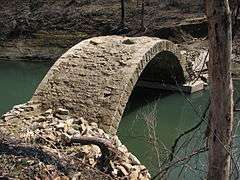 |
(#90000978) | Hillsdale Township Road 62 over Garvin Brook 44°03′22″N 91°44′52″W / 44.05599°N 91.747757°W |
Winona vicinity | 1895 stone arch bridge, called the state's "most impressive" rural specimen for its fine ashlar masonry and 45-foot (14 m) span.[49] Destroyed in the 2007 Midwest flooding.[50] | |
| 2 | E. L. King House (Rockledge) | Upload image | (#82003086) | U.S. Route 61 |
Winona vicinity | 1911 Prairie School house.[51] Demolished in 1988.[52] | |
| 3 | James P. Pearson Steamboat/Julius C. Wilkie Steamboat | Upload image | (#75001035) | Foot of Main St. at Mississippi River (Levee Park) |
Winona | Destroyed by arson in 1981.[52] | |
| 4 | Stockton Mill | Upload image | (#75001034) | 8th St. |
Stockton | 1890 mill.[53] Destroyed by arson in 1988.[52] |
See also
- List of National Historic Landmarks in Minnesota
- National Register of Historic Places listings in Minnesota
References
- ↑ "National Register of Historic Places: Weekly List Actions". National Park Service, United States Department of the Interior. Retrieved on December 16, 2016.
- 1 2 Numbers represent an ordering by significant words. Various colorings, defined here, differentiate National Historic Landmarks and historic districts from other NRHP buildings, structures, sites or objects.
- ↑ The eight-digit number below each date is the number assigned to each location in the National Register Information System database, which can be viewed by clicking the number.
- ↑ Gernes, William D. (1977-02-18). "National Register of Historic Places Inventory -- Nomination Form: Anger's Block" (PDF). National Park Service. Retrieved 2015-07-19.
- 1 2 3 4 5 6 Curran, Christine A.; Charlene K. Roise (May 1998). "National Register of Historic Places Registration Form: Winona Commercial Historic District" (PDF). National Park Service. Retrieved 2015-06-27.
- ↑ Lutz, Thomas (1973-03-26). "National Register of Historic Places Inventory – Nomination Form: Bunnell House" (PDF). National Park Service. Retrieved 2015-07-19.
- ↑ "Our Museums". Winona County Historical Society. 2015. Retrieved 2015-07-19.
- ↑ Lucas, Amy M.; Carole S. Zellie (2011-06-30). "National Register of Historic Places Registration Form: Central Grade School" (PDF). National Park Service. Retrieved 2015-07-15.
- ↑ Gaut, Greg (2012-12-17). "National Register of Historic Places Registration Form: Chicago, Milwaukee & St. Paul Railway Station" (PDF). National Park Service. Retrieved 2013-08-02.
- ↑ Lund, Marjorie; Charles W. Nelson (1976-03-02). "National Register of Historic Places Inventory -- Nomination Form: Choate Building" (PDF). National Park Service. Retrieved 2015-07-19.
- ↑ Frame III, Robert M. (August 1984). "National Register of Historic Places Inventory—Nomination Form: St. Stanislaus Polish Catholic Church" (PDF). National Park Service. Retrieved 2015-07-17.
- ↑ Kudzia, Camille (February 1984). "National Register of Historic Places Inventory—Nomination Form: Holy Trinity Catholic Church" (PDF). National Park Service. Retrieved 2015-07-17.
- ↑ Koop, Michael (February 1989). "National Register of Historic Places Registration Form: East Second Street Commercial Historic District" (PDF). National Park Service. Retrieved 2015-07-16.
- ↑ Kudzia, Camille (February 1984). "National Register of Historic Places Inventory—Nomination Form: Ellsworth, Benjamin, House" (PDF). National Park Service. Retrieved 2015-07-16.
- ↑ Frame III, Robert M. (August 1984). "National Register of Historic Places Inventory—Nomination Form: Gallagher, Dr. J.W.S., House" (PDF). National Park Service. Retrieved 2015-07-15.
- ↑ Gernes, William D.; Charles W. Nelson (1976-12-03). "National Register of Historic Places Inventory -- Nomination Form: Grain and Lumber Exchange Building" (PDF). National Park Service. Retrieved 2015-07-15.
- ↑ Kudzia, Camille (March 1984). "National Register of Historic Places Inventory—Nomination Form: Hemmelberg, William, House" (PDF). National Park Service. Retrieved 2015-07-15.
- ↑ Frame III, Robert M. (August 1984). "National Register of Historic Places Inventory—Nomination Form: Hodgins, Abner F., House" (PDF). National Park Service. Retrieved 2015-07-15.
- ↑ Nelson, Charles W. (1976-07-30). "National Register of Historic Places Inventory -- Nomination Form: Huff, Henry/Lamberton, H.W., House" (PDF). National Park Service. Retrieved 2015-07-15.
- ↑ Lucas, Amy M.; Carole S. Zellie (2011-06-29). "National Register of Historic Places Registration Form: Jefferson School" (PDF). National Park Service. Retrieved 2015-07-15.
- ↑ Lutz, Thomas (1975-03-26). "National Register of Historic Places Inventory -- Nomination Form: Kirch/Latch Building" (PDF). National Park Service. Retrieved 2015-07-12.
- ↑ Gaut, Greg (2014-02-10). "National Register of Historic Places Registration Form: Laird, Norton Company Building" (PDF). National Park Service. Retrieved 2014-08-04.
- ↑ Lucas, Amy M.; Carole S. Zellie (2011-06-30). "National Register of Historic Places Registration Form: Madison School" (PDF). National Park Service. Retrieved 2015-07-15.
- ↑ Nelson, Charles W.; William D. Gernes (1977-07-01). "National Register of Historic Places Inventory – Nomination Form: Merchants National Bank" (PDF). National Park Service. Retrieved 2015-07-11.
- ↑ Lutz, Thomas (1974-07-18). "National Register of Historic Places Inventory – Nomination Form: Merchants National Bank" (PDF). National Park Service. Retrieved 2015-07-11.
- ↑ Gaut, Greg (2013-05-17). "National Register of Historic Places Registration Form: Model School Building and College Hall of the Winona Normal School" (PDF). National Park Service. Retrieved 2014-01-12.
- ↑ Grossman, John (1970-05-11). "National Register of Historic Places Inventory – Nomination Form: Pickwick Mill" (PDF). National Park Service. Retrieved 2015-07-05.
- ↑ "Pickwick Mill". Pickwick Mill Association. Retrieved 2012-10-29.
- ↑ Kudzia, Camille (March 1984). "National Register of Historic Places Inventory—Nomination Form: St. Charles City Bakery" (PDF). National Park Service. Retrieved 2015-07-05.
- ↑ Gimmestad, Dennis (April 1982). "National Register of Historic Places Inventory—Nomination Form: Schlitz Hotel" (PDF). National Park Service. Retrieved 2015-07-02.
- ↑ Zellie, Carole (1989-05-31). "National Register of Historic Places Registration Form: Sugar Loaf" (PDF). National Park Service. Retrieved 2015-07-02.
- ↑ Nelson, Charles W.; Susan Zeik (1977-06-15). "National Register of Historic Places Inventory -- Nomination Form: Sugar Loaf Brewery" (PDF). National Park Service. Retrieved 2015-07-01.
- ↑ Kudzia, Camille (February 1984). "National Register of Historic Places Inventory—Nomination Form: Trinity Episcopal Church" (PDF). National Park Service. Retrieved 2015-07-01.
- ↑ Kudzia, Camille (January 1984). "National Register of Historic Places Inventory—Nomination Form: Trinity Protestant Episcopal Church" (PDF). National Park Service. Retrieved 2015-06-30.
- ↑ Lucas, Amy M.; Carole S. Zellie (2011-06-30). "National Register of Historic Places Registration Form: Washington-Kosciusko School" (PDF). National Park Service. Retrieved 2015-07-15.
- ↑ Frame III, Robert M. (August 1984). "National Register of Historic Places Inventory—Nomination Form: J.R. Watkins Medical Company Complex" (PDF). National Park Service. Retrieved 2015-06-29.
- ↑ Frame III, Robert M. (August 1984). "National Register of Historic Places Inventory—Nomination Form: Watkins, Paul, House" (PDF). National Park Service. Retrieved 2015-06-29.
- ↑ Kudzia, Camille (March 1984). "National Register of Historic Places Inventory—Nomination Form: Whitewater Avenue Commercial Historic District" (PDF). National Park Service. Retrieved 2015-06-29.
- ↑ Anderson, Rolf T. (1988-09-16). "National Register of Historic Places Registration Form: Whitewater State Park CCC/WPA/Rustic Style Historic Resources" (PDF). National Park Service. Retrieved 2015-06-28.
- ↑ McKechnie, Mark (1983-04-13). "National Register of Historic Places Inventory—Nomination Form: Winona & St. Peter Engine House" (PDF). National Park Service. Retrieved 2015-06-28.
- ↑ McKechnie, Mark; Charles W. Nelson (1982-11-03). "National Register of Historic Places Inventory—Nomination Form: Winona & St. Peter Railroad Freight House" (PDF). National Park Service. Retrieved 2015-06-28.
- ↑ Curran, Christine A. (January 1999). "National Register of Historic Places Registration Form: Winona City Hall" (PDF). National Park Service. Retrieved 2015-06-28.
- ↑ Cavin, Brooks (1970-11-02). "National Register of Historic Places Inventory – Nomination Form: Winona County Courthouse" (PDF). National Park Service. Retrieved 2015-06-26.
- ↑ Gernes, William D.; Charles W. Nelson (1976-12-03). "National Register of Historic Places Inventory -- Nomination Form: Winona Free Public Library" (PDF). National Park Service. Retrieved 2015-06-26.
- ↑ Gales, Elizabeth A. (2003). "National Register of Historic Places Registration Form: Winona High School and Winona Junior High School" (PDF). National Park Service. Retrieved 2015-06-26.
- ↑ Kudzia, Camille (June 1982). "National Register of Historic Places Inventory—Nomination Form: Winona Hotel" (PDF). National Park Service. Retrieved 2015-06-24.
- ↑ Curran, Christine A.; Charlene K. Roise; Charles W. Nelson (August 1997). "National Register of Historic Places Registration Form: Winona Masonic Temple" (PDF). National Park Service. Retrieved 2015-06-24.
- ↑ Nelson, Charles W. (1977-01-05). "National Register of Historic Places Inventory -- Nomination Form: Winona Savings Bank Building" (PDF). National Park Service. Retrieved 2015-06-20.
- ↑ Hess, Jeffrey A. (August 1988). "National Register of Historic Places Registration Form: Bridge No. L1409" (PDF). National Park Service. Retrieved 2015-07-22.
- ↑ Gardner, Denis (2008). Wood, Concrete, Stone, and Steel: Minnesota's Historic Bridges. Minneapolis: University of Minnesota Press. p. 37. ISBN 9780816646661.
- ↑ "King, E.L., House (Rockledge) (removed)". Minnesota National Register Properties Database. Minnesota Historical Society. 2009. Retrieved 2013-08-02.
- 1 2 3 Nord, Mary Ann (2003). The National Register of Historic Places in Minnesota. Minnesota Historical Society. ISBN 0-87351-448-3.
- ↑ "Stockton Mill (removed)". Minnesota National Register Properties Database. Minnesota Historical Society. 2009. Retrieved 2013-08-02.
External links
| Wikimedia Commons has media related to National Register of Historic Places in Winona County, Minnesota. |
- Minnesota National Register Properties Database—Minnesota Historical Society
This article is issued from Wikipedia - version of the 11/30/2016. The text is available under the Creative Commons Attribution/Share Alike but additional terms may apply for the media files.

